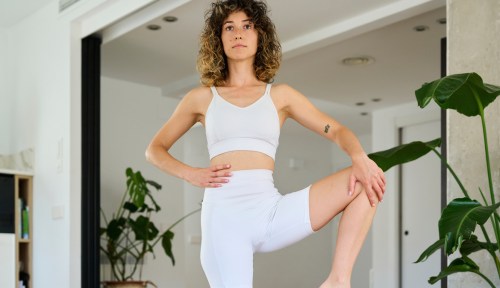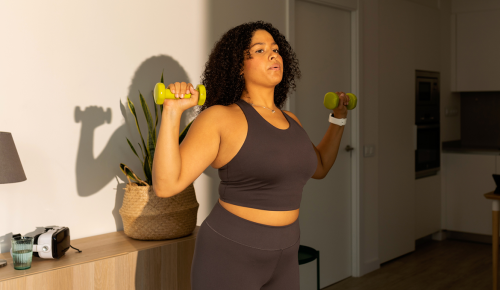When it comes to turning around a “meh” day, there’s nothing quite like going for a walk. No matter what kind of mood you find yourself in, squeezing in some strides can boost your mental well-being while offering a slew of cardiovascular benefits. So we went deep on the benefits of walking for health.
Experts in This Article
nutritionist and fitness trainer with Onyx
New Jersey-based cardiologist
walking coach, ACE-certified fitness instructor, author, and creator of My Walking Coach
vice president of programming and education at BFT
We asked experts far and wide how to make the most out of your time on your feet—and get ready, because their answers are good.
Keep reading for a break down of why walking is a stellar cardiovascular workout, and how you can maximize the benefits on your next stroll around your neighborhood. Lace up those sneakers, because you’re going to be ready to go, go, go.
5 things we’ve learned about walking—and why it’s so good for you
1. Walking benefits your cardiovascular health, even if it doesn’t make your heart race
If you’re checking your heart rate during your daily walks and wondering if you’re actually reaping the cardiovascular benefits, fret no more. This year, Michael Weinrauch, MD, a New Jersey cardiologist, told us than even a non-vigorous walk pays off in spades.
“The take-home point here is that even 15 minutes a day of walking, without stopping, provides benefit with regards to cardiovascular morbidity and mortality,” he said.
Research has found that 15 daily minutes of activity results in a 22 percent lower risk of death, and walking was associated with a 43 percent reduced risk in stroke as well as a reduction in the risk factors of heart attack—regardless of your heart rate. Of course, you can also pick up the pace to reap even more rewards.
A cardiologist explains how to use your smartwatch to keep track of your heart rate:
2. Set a clear intention for your walking routine to make sure it actually sticks
Many of us want to commit to a daily neighborhood walk, but 6 p.m. rolls around before we know it and, alas, we haven’t even stepped outside. To actually make your midday stroll a habit, walking coach and ACE-certified trainer Michele Stanten says you need to get clear on your “why.”
“When you go out and take that walk, you come back better,” said Stanten. “There’s research showing that 15 minutes of walking can boost your creativity and your problem-solving skills. There’s evidence that walking elevates your mood, reduces anxiety, and eases stress. So try shifting your thinking so that your walk isn’t something you have to do; look at how it’s benefiting you.”
Once you’ve gotten clear on why stepping outside matters to you, start with a short walk around the block and slowly increase your time from there. (Pro tip: Save your favorite podcast for your walk and make sure you’re wearing good walking shoes.)
3. Spice up your daily walks with weights, bodyweight exercises, and mobility
So you walks need an extra something something? Master personal trainer Juliet Root says that it’s easy to up the benefits on your daily boost of cardio with three easy techniques. First, add a set of dumbbells. “Walking already works your core and entire lower body, but adding in some weights can take things up a notch and work your upper body, as well as spike your heart rate,” she said.
Next, try incorporating a few different mobility moves to protect the integrity of your joints (think: hip circles, leg swings, and arm circles). And finally, you can add bodyweight movements like lunges and squats to target different muscles groups when you’re on the go. Mix and match these three techniques for walks that are anything but boring.
4. Walking can have as many benefits as running
Walking often gets touted as “running lite,” but that, my friends, is a myth. “You can perform a well-designed walking workout, and it can be very difficult,” said Steve Stonehouse, NASM-CPT, USATF-certified run coach and director of education for STRIDE.
“Variables like speed, incline, and duration will all impact the effectiveness of your workout,” he says. In other words: Walking yields many of the same benefits of running, so get out there and enjoy your time outdoors.
5. Make the most of walk by adding hills and intervals
Let’s say you have a mile walk on the books and you want to introduce a little novelty? Stonehouse recommends adding hills (to challenge your glutes and hamstrings), or incorporating intervals (periods where you pick up the pace) to shape things up a little.
For example, maybe you push your pace for one full minute, then slow down to a recovery walk pace for another three minutes, and keep repeating. Or, challenge yourself to take the hills at a slightly faster pace than the rest of your walk. Have fun with it.
How to keep your walking motivation going
Walking is no different than any other form of exercise when it comes to motivation. Here are a few key ways to keep yourself moving, according to the National Institute on Aging:
- Walk with other people: Enlist a friend to join in on your miles or find a walking group. This will make the activity more social and fun.
- Choose a convenient time: Of course there may be days where you’re not able to walk at the same time as you usually do. But striving for logging your miles at a time each day when you know you won’t be interrupted helps keep you consistent.
- Keep track of your progress: Seeing how far you’ve come and rewarding yourself when you hit goals will help you stay on track.
FAQ
1. How much walking a day is good for you?
Is walking enough exercise? In short: yes! You should aim to get 150 minutes of moderate-intensity aerobic activity—like walking—per week, according to the Centers for Disease Control and Prevention (CDC). This translates to 30 minutes of walking five days per week to strengthen your heart, lower your risk of heart disease, and improve your brain function, immune system, and mood.
However, there’s no harm in walking more than that! You’ll see even greater health benefits exceeding 30 minutes five days a week.
2. Is it better to walk faster or longer?
Good news: You don’t have to choose between walking faster or farther. The health benefits of walking are very similar no matter your speed or distance.
“Speed gets you more bang for the buck if you have limited time to exercise,” sports cardiologist John Higgins, MD, previously told Well+Good. “About 15 minutes of high intensity [walking] a day equals about 30 minutes of moderate intensity.”
That being said, Dr. Higgins said if you’ve got the time, taking a longer, more relaxing stroll offers the same heart health benefits.
“I recommend doing at least one high-intensity workout per week, or every other week. On the rest of the days, do your moderate workouts,” Dr. Higgins said.
Sign Up for Our Daily Newsletter
Get all the latest in wellness, trends, food, fitness, beauty, and more delivered right to your inbox.
Got it, you've been added to our email list.











